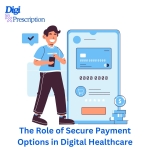
The Role of Secure Payment Options in Digital Healthcare
The digital transformation of healthcare has brought about immense convenience for both providers and patients. One critical aspect of this transformation is the integration of secure payment options. These systems not only streamline the payment process but also ensure patient data protection, regulatory compliance, and trust in the healthcare system. This blog explores the importance of secure payment options in digital healthcare and how they contribute to the success of medical practices.
Why Secure Payment Options Matter in Healthcare
1. Data Security
Healthcare providers handle sensitive patient information, including personal and financial data. Secure payment systems protect this data using encryption, fraud detection, and compliance with regulations like PCI DSS (Payment Card Industry Data Security Standard).
2. Compliance with Healthcare Laws
Secure payment options ensure compliance with regulations such as HIPAA (Health Insurance Portability and Accountability Act), safeguarding patient information from breaches.
3. Trust Building
Patients are more likely to pay online when they trust the platform. Secure payment options foster trust by ensuring transactions are safe and confidential.
4. Reduced Fraud Risks
Advanced technologies like tokenization, two-factor authentication, and secure gateways reduce the risk of payment fraud, protecting both providers and patients.
5. Convenience for Patients
Patients can pay via credit/debit cards, digital wallets, or bank transfers, offering flexibility and ease.
Key Features of Secure Payment Options in Digital Healthcare
1. Encryption
All transactions are encrypted, making it nearly impossible for hackers to intercept sensitive data.
2. Tokenization
Payment data is replaced with unique tokens, which reduces the risk of sensitive information being stored or leaked.
3. Secure Gateways
Platforms like PayPal and Stripe act as intermediaries, processing payments without exposing card details to healthcare providers.
4. Two-Factor Authentication (2FA)
Patients and providers can add an extra layer of security by verifying transactions via SMS codes or email.
5. Fraud Detection Systems
Secure payment platforms monitor for suspicious activities and alert providers to potential fraud.
Benefits of Secure Payment Options for Healthcare Providers
1. Faster Payment Processing
Instant online payments reduce delays and improve cash flow for clinics.
2. Simplified Payment Management
Digital payment systems automate tasks such as invoicing, payment reminders, and reconciliation.
3. Increased Patient Satisfaction
Patients appreciate the convenience and transparency of secure payment systems.
4. Scalability
Secure payment options can grow with the clinic, accommodating more patients and transactions seamlessly.
Steps to Implement Secure Payment Systems in Your Practice
- Choose a Trusted Provider: Opt for established platforms like PayPal, Stripe, or Square, which prioritize security and compliance.
- Integrate with Existing Systems: Ensure the payment solution integrates with your practice management or digital prescription software.
- Train Your Team: Educate staff on the importance of secure payments and how to handle transactions.
- Educate Patients: Provide guides or tutorials to help patients use secure payment options confidently.
- Monitor Transactions: Use built-in analytics to track payments, detect fraud, and improve financial management.
Top Secure Payment Platforms for Healthcare
- PayPal: A trusted name with global acceptance, offering encryption and fraud protection.
- Stripe: Known for robust APIs and support for recurring payments.
- Square: Ideal for both in-person and online payments, with easy-to-use hardware and software.
- Digi Prescription: Tailored for healthcare, combining secure payment processing with patient management features.
The Future of Secure Payments in Digital Healthcare
As technology evolves, secure payment options will continue to enhance the digital healthcare ecosystem. Innovations like blockchain, biometric authentication, and AI-driven fraud detection will further strengthen payment security.
Conclusion
Secure payment options are the backbone of financial management in digital healthcare. By safeguarding patient data, complying with regulations, and offering convenience, they create a seamless and trustworthy payment experience. For clinics aiming to build patient loyalty and streamline operations, adopting secure payment systems is a step toward long-term success.
